Grammarflex


What’s the Plural of Thesis? (Thesises? Theses?)
- November 13, 2022

What’s the plural of “thesis”?
Thesis , (and its plural theses ) is an example of one of the many common English words that has roots elsewhere. In this case, thesis is a word that has roots all the way back to Ancient Greek. Like other similarly structured words: diagnosis , synthesis , analysis , oasis , crisis , nemesis and the like, thesis is by no means the only frequently used Greek word that’s made it to Modern English.
What’s the singular of thesis?
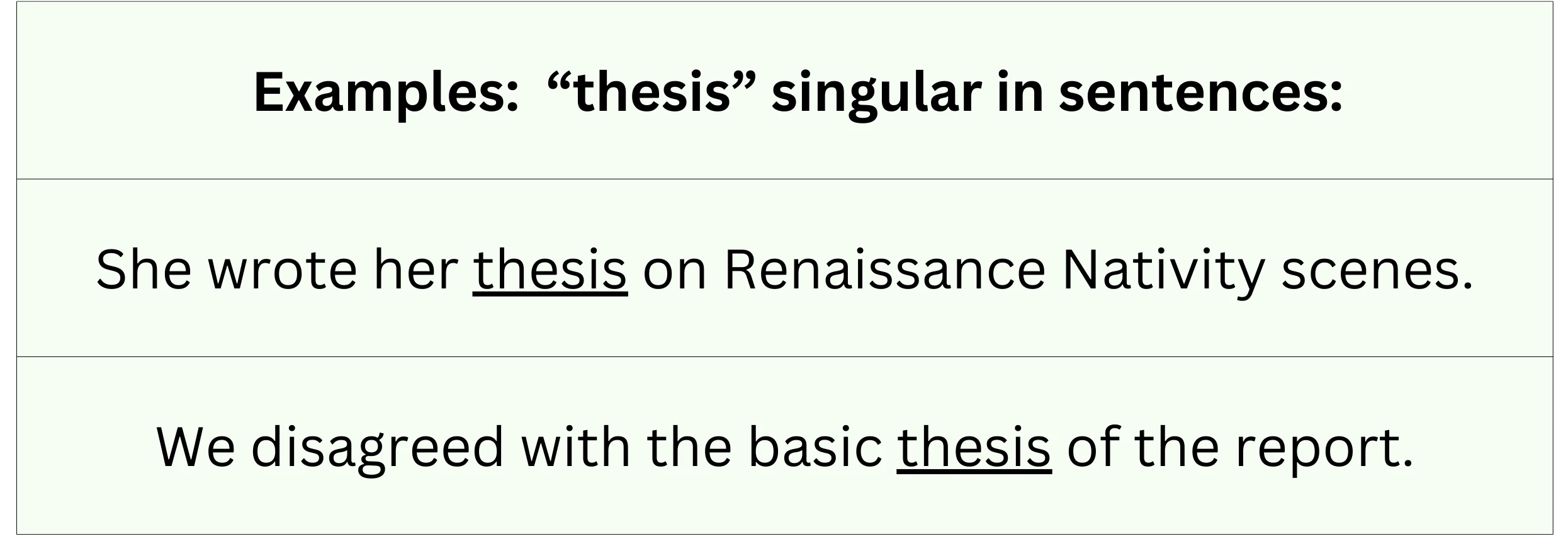
Thesis is a singular noun and refers to one thing (or one thesis ).
What’s a thesis?
Merriam-Webster defines the noun thesis (plural theses ) as follows, “a dissertation embodying results of original research and especially substantiating a specific view especially : one written by a candidate for an academic degree.”
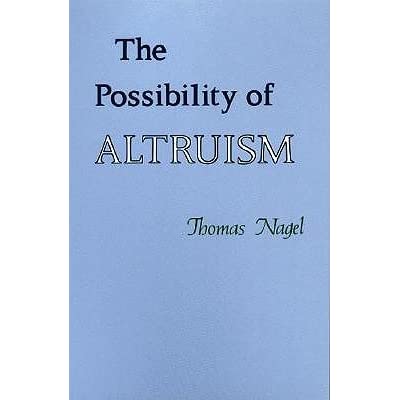
Nouns that end in -sis/ses
Thesis is an irregular plural noun that does not end in the typical -s / -es that regular plural noun forms take. This is so despite that theses plural does in fact end in the conventional -s/-es suffix. Why is it still considered irregular; then, given that it follows the regular plural form? Notice the following regular plural noun forms:
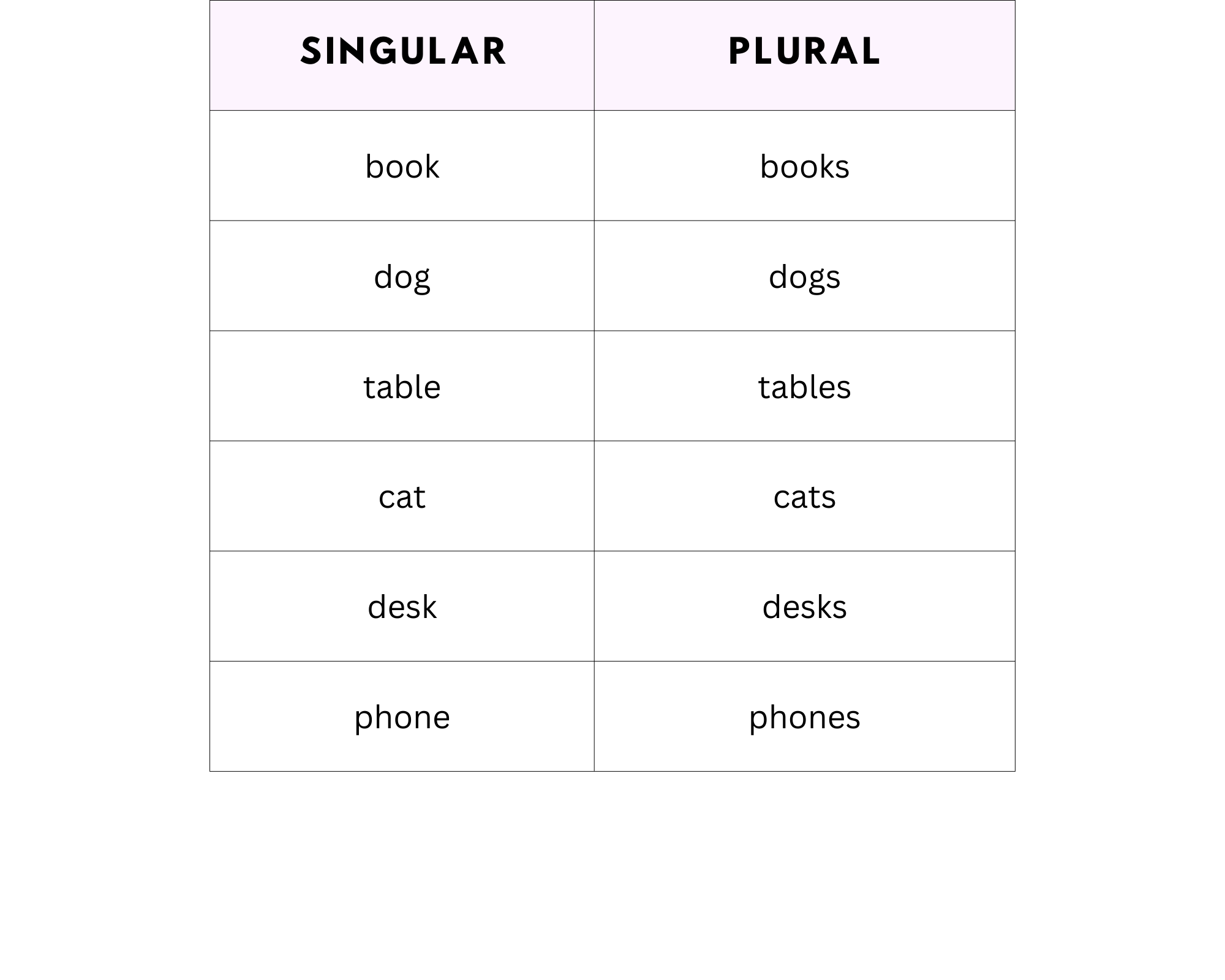
Thesis / theses operates differently. With these Greek words, the -ses does not simply add onto the end of the singular form of the noun; instead, -ses replaces the singular noun’s suffixes, and effectively changes the entire spelling of the word (and arguably the word itself.)
Examples of “thesis” (singular) in sentences
His master thesis was on modal neural networks.
She wrote her thesis on Renaissance Nativity scenes.
We disagreed with the basic thesis of the report.
I’ve made a first draft of my thesis .
The student’s experiments helped her formulate a thesis to share with her professor and classmates.
Examples of “theses” (plural) in sentences
It must not be assumed that Luther’s ninety-five theses produced any considerable direct results.
The collection of theses are ready for publication.
Twenty years after Savonarola’s death Martin Luther made public his theses against indulgences.
Theses are generally examined by two or more specialists.
Theses is the plural form of the singular noun thesis.
Origin of the word “thesis”
Thesis / theses are of Greek origin.
Read about other irregular nouns
- What’s the plural of bison?
- What’s the plural of moose?
- What’s the plural of sheep?
- What’s the plural of ox?
- What’s the plural of cactus?
- What’s the plural of crisis?
- What’s the plural of hypothesis?
Read about other topics in grammar
- What’re personal pronouns?
- What’s the difference between they’re, their, and there?
- Whose vs who’s?
- Merriam-Webster, thesis/theses.
Recent Posts

“Beck and Call” or “Beckon Call”? Which is Correct?
Meaning of ‘beck and call’ ‘To be at someone’s beck and call‘ is an idiomatic expression that describes being immediately available, or ready to be

What’s the Meaning of the Word “Connotation”?
Ever catch bad vibes from a text? Any feeling or internal response you have from the actual words used to is its connotation; which perhaps

What’s the Difference Between Ambiguous & Ambivalent?
Are ambiguous and ambivalent the same? Something ambiguous (an adjective) is unclear, vague and open to different interpretations. To be ambivalent (also an adjective) means

When to Use Have or Had? (Explained with Examples)
When should you use “have” or “had”? When is it correct to use have, has, or had? Phrased differently, what’s the past tense of have?

What’s the Past Participle? (Explanation & Usage)
The past participle is a form of a verb that can appear as an adjective, or be used to form specific tenses and the passive

Emigrate vs. Immigrate (Meaning + Examples)
Meaning of emigrate vs. immigrate To immigrate is the verb form of the noun immigrant; referring to someone that’s moved away from their birth country

Recurring vs. Reoccurring (Correct Usage, + Examples)
Did you have a recurring or reoccurring dream? If you’re finding the difference between these two words befuddling, then this post is for you. How

What’s the Difference Between Nevertheless vs. Nonetheless?
Nevertheless vs. nonetheless Nevertheless and nonetheless are synonyms that both belong to the same part of speech; i.e, they’re compound adverbs that express contrast. There

Assent or Ascent (or Accent?)
When to use assent, ascent and accent The differences between assent, ascent and accent: Assent may be a noun or a verb: the former refers
English Teacher Site
Whats the Plural of Thesis: Understanding Singular and Plural Forms
- The plural of “thesis” adheres to the Greek-rooted pattern, changing the singular -is to a plural -es.
- Accurate use of “thesis” and “theses” reflects scholarly precision in both written and oral communication.
- Awareness of correct pluralization extends to other similar nouns ending in -sis, emphasizing the importance of understanding language origins.
It is crucial to use the word correctly in both singular and plural contexts to maintain the integrity of written and spoken communication. In the realm of academics, precision in language reflects the rigor of one’s research and argumentation. As such, understanding the transformation from “thesis” to its plural counterpart is more than a trivial detail; it reflects a deeper appreciation for the structure and history of the English language.
What’s the Plural of Thesis?
The proper plural of thesis is “theses.” This transformation is part of a broader pattern in the English language where certain nouns change their ending to reflect a plural state.
Below, a comparison is made to illustrate the standard singular to plural transformation for nouns ending in -is:
Key Points about the pluralization of “thesis”:
- The plural follows a specific rule of changing the ‘-is’ ending to ‘-es’.
- This pattern is consistent with other Greek-derived words.
- The pronunciation changes with the plural form, ending in “-eez.”
To clarify usage, consider these examples:
- Singular: The student’s thesis was commended for its clarity.
- Plural: The professor read all the submitted theses before the conference.
Singular Form of Thesis
The singular form of ‘thesis’ is of notable interest due to its origins and distinct pluralization.
Origination and Definition:
- Etymology : Derived from the ancient Greek word τίθημι (tithēmi), which means “to put” or “to place.”
- Meaning : It is a statement or theory put forward to be maintained or proved.
Usage in Academia:
- A significant piece of writing prepared by a student to obtain a university degree or diploma.
- Often involves original research and substantiates a particular view or argument.
Table 1: Notable Features of ‘Thesis’
Table 2: Contextual Examples
Definition of Thesis
A thesis is a substantial piece of scholarly writing that is typically required to obtain a master’s or doctoral degree. It represents the author’s research and findings in their chosen field of study. A thesis serves as evidence that the student has acquired the knowledge necessary to be considered a scholar in the field. Here, two key aspects of a thesis will be described through tables:
Purpose and Composition of a Thesis:
Characteristics of a Thesis:
- Focused : It should have a clear, concise premise or central argument.
- Researched : Employs rigorous methodologies to gather and analyze data.
- Structured : Contains defined sections that present information logically.
- Cited : Includes proper citations of sources that support or contrast the thesis.
- Reviewed : Undergoes scrutiny by academic peers or supervisors.
Other Irregular Plural Nouns Ending in -sis/ses
Below you will find two tables categorized by common and less common irregular plurals that follow this pattern.
Common Irregular Plurals:
This pattern is often observed with words that have Greek origins.
Less Common Irregular Plurals:
It is important to recognize these forms to maintain grammatical accuracy in writing and speech. Below is a list of examples used in sentences:
- When multiple scientific hypotheses are tested, the results can lead to important discoveries.
- During the editing process, Jane had to review all the parentheses to ensure clarity in her writing.
- Geographers study multiple oases in the desert to understand these unique ecosystems.
- His thesis on renewable energy was well-received, and many theses on the subject reference his work.
Examples of Thesis (Singular) in Sentences
Here are examples that demonstrate its usage in various sentences.
In Academic Context
In everyday discourse.
Informal setting : During the debate, his thesis was that space exploration is no longer just a dream but a necessity.
- Discussing beliefs : Her thesis is that all public spaces should offer free Wi-Fi.
- Opinion : They argued the thesis that high taxes discourage spending.
Examples of Theses (Plural) in Sentences
Here are some examples of how “theses” can be used in sentences:
Education Setting : Graduate students often struggle to find unique topics for their theses as most ideas have been extensively explored.
- Evaluating the structure and arguments of different theses can help one build a stronger dissertation.
Origin of the Word Thesis
The term thesis originates from the ancient Greek word θέσις (thésis), which means “a proposition” . Historically, this term has played a crucial role in both rhetorical and academic contexts. It denotes a statement that a writer intends to support and prove. In academic circles, thesis often refers to a document that presents the author’s research and findings and is submitted in support of candidature for a degree or professional qualification.
Etymological Background
The journey of the word from its Greek roots to the modern English language reflects the changing dynamics of educational and scholarly practices over the centuries.
As a carryover from Greek to Latin, the word made its way into English, maintaining its original Greek plural form:
Usage in Academia
In academia, the word has been used since the late Middle Ages to denote a scholarly work written by students aiming to obtain a university degree. Over time, the use of thesis expanded from merely referring to a proposition to a lengthy document providing evidence of comprehensive research.
Historical Evolution:
- Middle Ages : Referred to propositions for a degree.
- Renaissance : Emphasized individual research.
- Modern Usage : Extensive research documents for higher education degrees.
Areas of Impact:
- Rhetoric : Considered as a premise to be argued.
- Academic Research : Reflects comprehensive study in a field.
Similar Posts
What’s the past tense of drink: a simple guide to english verbs.
The past participle form of “drink” is “drunk,” which is used with auxiliary verbs to create the perfect tenses. For instance, one might say, “He had drunk the entire bottle before we arrived.” It’s important to distinguish between the simple past and the past participle to use the verb “drink” correctly in various tenses. The…
What’s the Plural of Dwarf: Understanding Singular and Plural Forms
The standard plural form in the English language is “dwarfs.” However, “dwarves” is also recognized, primarily influenced by modern fantasy literature. The latter was popularized by the writings of J.R.R. Tolkien, the famous author of “The Hobbit” and “The Lord of the Rings.” When discussing real-life individuals with the condition known as dwarfism, “dwarfs” is…
Criteria Singular or Plural: Understanding Grammatical Number
“Criterion” refers to a single standard by which something may be judged, whereas “criteria” are the multiple standards used in making a judgment or decision. Understanding when to use “criteria” and “criterion” correctly is important for precise communication. The Plurality of Criteria In English grammar, the distinction between singular and plural forms is fundamental, and…
What Are Mass Nouns: Understanding the Difference Between Mass and Collective Nouns
While mass nouns typically do not have a plural form and use singular verbs, collective nouns, despite representing multiple entities, can still pair with singular or plural verbs based on whether the action is considered collectively or individually. This subtle distinction often leads to confusion, with certain nouns being challenging to classify and use correctly….
What’s the Plural of Goose? Unraveling Language Mysteries
The English language is replete with interesting rules and exceptions, particularly when it comes to plurals. One such case is the word ‘goose,’ which belongs to the family Anatidae, placing it between the larger swans and the smaller ducks. The plural form of ‘goose’ is not formed by simply adding an ‘s’ as with most…
Altogether vs All Together: Which is Correct? How to Use Both Plus Examples
“Altogether” is an adverb that means “completely” or “entirely.” It can be used to describe a situation or action that is done in full. For example, “She was altogether successful in her endeavors. ” On the other hand, “all together” is a phrase that means “everyone or everything in a group.” For instance, “They gathered…
Leave a Reply Cancel reply
You must be logged in to post a comment.
- More from M-W
- To save this word, you'll need to log in. Log In
Definition of thesis
Did you know.
In high school, college, or graduate school, students often have to write a thesis on a topic in their major field of study. In many fields, a final thesis is the biggest challenge involved in getting a master's degree, and the same is true for students studying for a Ph.D. (a Ph.D. thesis is often called a dissertation ). But a thesis may also be an idea; so in the course of the paper the student may put forth several theses (notice the plural form) and attempt to prove them.
Examples of thesis in a Sentence
These examples are programmatically compiled from various online sources to illustrate current usage of the word 'thesis.' Any opinions expressed in the examples do not represent those of Merriam-Webster or its editors. Send us feedback about these examples.
Word History
in sense 3, Middle English, lowering of the voice, from Late Latin & Greek; Late Latin, from Greek, downbeat, more important part of a foot, literally, act of laying down; in other senses, Latin, from Greek, literally, act of laying down, from tithenai to put, lay down — more at do
14th century, in the meaning defined at sense 3a(1)
Dictionary Entries Near thesis
the sins of the fathers are visited upon the children
thesis novel
Cite this Entry
“Thesis.” Merriam-Webster.com Dictionary , Merriam-Webster, https://www.merriam-webster.com/dictionary/thesis. Accessed 15 May. 2024.
Kids Definition
Kids definition of thesis, more from merriam-webster on thesis.
Nglish: Translation of thesis for Spanish Speakers
Britannica English: Translation of thesis for Arabic Speakers
Britannica.com: Encyclopedia article about thesis
Subscribe to America's largest dictionary and get thousands more definitions and advanced search—ad free!

Can you solve 4 words at once?
Word of the day.
See Definitions and Examples »
Get Word of the Day daily email!
Popular in Grammar & Usage
More commonly misspelled words, your vs. you're: how to use them correctly, every letter is silent, sometimes: a-z list of examples, more commonly mispronounced words, how to use em dashes (—), en dashes (–) , and hyphens (-), popular in wordplay, the words of the week - may 10, a great big list of bread words, 10 scrabble words without any vowels, 8 uncommon words related to love, 9 superb owl words, games & quizzes.

- Dictionaries home
- American English
- Collocations
- German-English
- Grammar home
- Practical English Usage
- Learn & Practise Grammar (Beta)
- Word Lists home
- My Word Lists
- Recent additions
- Resources home
- Text Checker
Definition of thesis noun from the Oxford Advanced Learner's Dictionary
- Students must submit a thesis on an agreed subject within four years.
- He presented this thesis for his PhD.
- a thesis for a master's degree
- He's doing a doctoral thesis on the early works of Shostakovich.
- Many departments require their students to do a thesis defense.
- She completed an MSc by thesis.
- her thesis adviser at MIT
- in a/the thesis
- thesis about
Join our community to access the latest language learning and assessment tips from Oxford University Press!
- The basic thesis of the book is fairly simple.
- These latest findings support the thesis that sexuality is determined by nature rather than choice.
- formulate/advance a theory/hypothesis
- build/construct/create/develop a simple/theoretical/mathematical model
- develop/establish/provide/use a theoretical/conceptual framework
- advance/argue/develop the thesis that…
- explore an idea/a concept/a hypothesis
- make a prediction/an inference
- base a prediction/your calculations on something
- investigate/evaluate/accept/challenge/reject a theory/hypothesis/model
- design an experiment/a questionnaire/a study/a test
- do research/an experiment/an analysis
- make observations/measurements/calculations
- carry out/conduct/perform an experiment/a test/a longitudinal study/observations/clinical trials
- run an experiment/a simulation/clinical trials
- repeat an experiment/a test/an analysis
- replicate a study/the results/the findings
- observe/study/examine/investigate/assess a pattern/a process/a behaviour
- fund/support the research/project/study
- seek/provide/get/secure funding for research
- collect/gather/extract data/information
- yield data/evidence/similar findings/the same results
- analyse/examine the data/soil samples/a specimen
- consider/compare/interpret the results/findings
- fit the data/model
- confirm/support/verify a prediction/a hypothesis/the results/the findings
- prove a conjecture/hypothesis/theorem
- draw/make/reach the same conclusions
- read/review the records/literature
- describe/report an experiment/a study
- present/publish/summarize the results/findings
- present/publish/read/review/cite a paper in a scientific journal
- The results of the experiment support his central thesis.
- Most people rejected this thesis at the time because it presumed evolution rather than creation.
- fundamental
Nearby words
- 1.1 Etymology
- 1.2 Pronunciation
- 1.3.1 Derived terms
- 1.3.2 Related terms
- 1.3.3 Translations
- 1.4 References
- 1.5 Further reading
- 1.6 Anagrams
- 2.1 Etymology
- 2.2 Pronunciation
- 3.1 Etymology
- 3.2 Pronunciation
- 3.3.1 Declension
- 3.3.2 Descendants
- 3.4 References
English [ edit ]
Etymology [ edit ].
From Late Middle English thesis ( “ lowering of the voice ” ) [1] and also borrowed directly from its etymon Latin thesis ( “ proposition, thesis; lowering of the voice ” ) , from Ancient Greek θέσῐς ( thésis , “ arrangement, placement, setting; conclusion, position, thesis; lowering of the voice ” ) , from τῐ́θημῐ ( títhēmi , “ to place, put, set; to put down in writing; to consider as, regard ” ) [2] [3] (ultimately from Proto-Indo-European *dʰeh₁- ( “ to do; to place, put ” ) ) + -σῐς ( -sis , suffix forming abstract nouns or nouns of action, process, or result ) . The English word is a doublet of deed .
Sense 1.1 (“proposition or statement supported by arguments”) is adopted from antithesis . [2] Sense 1.4 (“initial stage of reasoning”) was first used by the German philosopher Johann Gottlieb Fichte (1762–1814), and later applied to the dialectical method of his countryman, the philosopher Georg Wilhelm Friedrich Hegel (1770–1831).
The plural form theses is borrowed from Latin thesēs , from Ancient Greek θέσεις ( théseis ) .
Pronunciation [ edit ]
- ( Received Pronunciation ) IPA ( key ) : /ˈθiːsɪs/ , ( archaic ) /ˈθɛsɪs/
- ( General American ) IPA ( key ) : /ˈθisɪs/
- Rhymes: -iːsɪs
- Hyphenation: the‧sis
- ( Received Pronunciation ) IPA ( key ) : /ˈθiːsiːz/
- ( General American ) IPA ( key ) : /ˈθisiz/
- Rhymes: -iːsiːz
- Hyphenation: the‧ses
Noun [ edit ]
thesis ( plural theses )
- ( rhetoric ) A proposition or statement supported by arguments .
- 1766 , [ Oliver Goldsmith ], “The Conclusion”, in The Vicar of Wakefield: [ … ] , volume II, Salisbury, Wiltshire: [ … ] B. Collins, for F [ rancis ] Newbery , [ … ] , →OCLC ; reprinted London: Elliot Stock , 1885 , →OCLC , pages 218–219 : I told them of the grave, becoming, and ſublime deportment they ſhould aſſume upon this myſtical occaſion, and read them two homilies and a theſis of my own compoſing, in order to prepare them.
- ( mathematics , computer science ) A conjecture , especially one too vague to be formally stated or verified but useful as a working convention.
- ( logic ) An affirmation , or distinction from a supposition or hypothesis .
- ( philosophy ) In the dialectical method of Georg Wilhelm Friedrich Hegel : the initial stage of reasoning where a formal statement of a point is developed ; this is followed by antithesis and synthesis .
- ( music , prosody , originally ) The action of lowering the hand or bringing down the foot when indicating a rhythm ; hence, an accented part of a measure of music or verse indicated by this action; an ictus , a stress . Antonym: arsis
- ( music , prosody , with a reversal of meaning ) A depression of the voice when pronouncing a syllables of a word ; hence, the unstressed part of the metrical foot of a verse upon which such a depression falls , or an unaccented musical note .
Derived terms [ edit ]
- all but thesis
- bachelor's thesis
- Church-Turing thesis
- conflict thesis
- doctoral thesis
- graduate thesis
- Habakkuk thesis
- master's thesis
- Merton thesis
- private language thesis
- thesis defense
- thesis film
- thesis statement
Related terms [ edit ]
Translations [ edit ], references [ edit ].
- ^ “ thē̆sis, n. ”, in MED Online , Ann Arbor, Mich.: University of Michigan , 2007 .
- ^ “ thesis, n. ”, in Lexico , Dictionary.com ; Oxford University Press , 2019–2022 .
Further reading [ edit ]
- “ thesis ”, in The Century Dictionary [ … ] , New York, N.Y.: The Century Co. , 1911 , →OCLC .
- “ thesis ”, in Webster’s Revised Unabridged Dictionary , Springfield, Mass.: G. & C. Merriam , 1913 , →OCLC .
Anagrams [ edit ]
- Heists , Sethis , heists , shiest , shites , sithes , thises
Dutch [ edit ]
From Latin thesis , from Ancient Greek θέσις ( thésis , “ a proposition, a statement, a thing laid down, thesis in rhetoric, thesis in prosody ” ) .
thesis f ( plural theses or thesissen , diminutive thesisje n )
- Dated form of these . Synonyms: dissertatie , proefschrift , scriptie
Latin [ edit ]
From Ancient Greek θέσις ( thésis , “ a proposition, a statement, a thing laid down, thesis in rhetoric, thesis in prosody ” ) .
- ( Classical ) IPA ( key ) : /ˈtʰe.sis/ , [ˈt̪ʰɛs̠ɪs̠]
- ( modern Italianate Ecclesiastical ) IPA ( key ) : /ˈte.sis/ , [ˈt̪ɛːs̬is]
thesis f ( genitive thesis ) ; third declension
Declension [ edit ]
Descendants [ edit ].
- → Dutch: thesis
- → Armenian: թեզ ( tʻez )
- → Dutch: these
- → Persian: تز ( tez )
- → Romanian: teză
- → Turkish: tez
- Galician: tese
- Italian: tesi
- English: thesis
- Portuguese: tese
- Spanish: tesis
- “ thesis ”, in Charlton T. Lewis and Charles Short ( 1879 ) A Latin Dictionary , Oxford: Clarendon Press
- thesis in Gaffiot, Félix ( 1934 ) Dictionnaire illustré latin-français , Hachette.
- English terms derived from Proto-Indo-European
- English terms derived from the Proto-Indo-European root *dʰeh₁-
- English terms inherited from Middle English
- English terms derived from Middle English
- English terms borrowed from Latin
- English terms derived from Latin
- English terms derived from Ancient Greek
- English doublets
- English 2-syllable words
- English terms with IPA pronunciation
- English terms with audio links
- Rhymes:English/iːsɪs
- Rhymes:English/iːsɪs/2 syllables
- Rhymes:English/iːsiːz
- English lemmas
- English nouns
- English countable nouns
- English nouns with irregular plurals
- en:Rhetoric
- English terms with quotations
- en:Mathematics
- en:Computer science
- en:Philosophy
- English contranyms
- Dutch terms derived from Latin
- Dutch terms derived from Ancient Greek
- Dutch terms with audio links
- Dutch lemmas
- Dutch nouns
- Dutch nouns with Latin plurals
- Dutch nouns with plural in -en
- Dutch feminine nouns
- Dutch dated forms
- Latin terms derived from Proto-Indo-European
- Latin terms derived from the Proto-Indo-European root *dʰeh₁-
- Latin terms borrowed from Ancient Greek
- Latin terms derived from Ancient Greek
- Latin 2-syllable words
- Latin terms with IPA pronunciation
- Latin lemmas
- Latin nouns
- Latin third declension nouns
- Latin feminine nouns in the third declension
- Latin feminine nouns
- Word of the day archive
- English entries with language name categories using raw markup
- Mandarin terms with redundant transliterations
- Russian terms with non-redundant manual transliterations
Navigation menu
Definition of 'thesis'

thesis in American English
Thesis in british english, examples of 'thesis' in a sentence thesis, related word partners thesis, trends of thesis.
View usage over: Since Exist Last 10 years Last 50 years Last 100 years Last 300 years
In other languages thesis
- American English : thesis / ˈθisɪs /
- Brazilian Portuguese : tese
- Chinese : 论点
- European Spanish : tesis
- French : thèse
- German : These
- Italian : tesi
- Japanese : 主張
- Korean : 논지
- European Portuguese : tese
- Spanish : tesis
- Thai : ข้อสมมุติ, ข้อวินิจฉัย

Browse alphabetically thesis
- thesis play
- thesmothete
- All ENGLISH words that begin with 'T'
Related terms of thesis
- academic thesis
- central thesis
- doctoral thesis
- View more related words
Quick word challenge
Quiz Review
Score: 0 / 5
Wordle Helper

Scrabble Tools

- Cambridge Dictionary +Plus
Meaning of thesis in English
Your browser doesn't support HTML5 audio
- I wrote my thesis on literacy strategies for boys .
- Her main thesis is that children need a lot of verbal stimulation .
- boilerplate
- composition
- dissertation
- essay question
- peer review
You can also find related words, phrases, and synonyms in the topics:
thesis | Intermediate English
Examples of thesis, collocations with thesis.
These are words often used in combination with thesis .
Click on a collocation to see more examples of it.
Translations of thesis
Get a quick, free translation!

Word of the Day
customer support
help and advice that a company makes available to customers when they have bought something

Varied and diverse (Talking about differences, Part 1)

Learn more with +Plus
- Recent and Recommended {{#preferredDictionaries}} {{name}} {{/preferredDictionaries}}
- Definitions Clear explanations of natural written and spoken English English Learner’s Dictionary Essential British English Essential American English
- Grammar and thesaurus Usage explanations of natural written and spoken English Grammar Thesaurus
- Pronunciation British and American pronunciations with audio English Pronunciation
- English–Chinese (Simplified) Chinese (Simplified)–English
- English–Chinese (Traditional) Chinese (Traditional)–English
- English–Dutch Dutch–English
- English–French French–English
- English–German German–English
- English–Indonesian Indonesian–English
- English–Italian Italian–English
- English–Japanese Japanese–English
- English–Norwegian Norwegian–English
- English–Polish Polish–English
- English–Portuguese Portuguese–English
- English–Spanish Spanish–English
- English–Swedish Swedish–English
- Dictionary +Plus Word Lists
- English Noun
- Intermediate Noun
- Collocations
- Translations
- All translations
To add thesis to a word list please sign up or log in.
Add thesis to one of your lists below, or create a new one.
{{message}}
Something went wrong.
There was a problem sending your report.
bottom_desktop desktop:[300x250]

paper-free learning
- conjunctions
- determiners
- interjections
- prepositions
- affect vs effect
- its vs it's
- your vs you're
- which vs that
- who vs whom
- who's vs whose
- averse vs adverse
- 250+ more...
- apostrophes
- quotation marks
- lots more...
- common writing errors
- FAQs by writers
- awkward plurals
- ESL vocabulary lists
- all our grammar videos
- idioms and proverbs
- Latin terms
- collective nouns for animals
- tattoo fails
- vocabulary categories
- most common verbs
- top 10 irregular verbs
- top 10 regular verbs
- top 10 spelling rules
- improve spelling
- common misspellings
- role-play scenarios
- favo(u)rite word lists
- multiple-choice test
- Tetris game
- grammar-themed memory game
- 100s more...
The Plural Forms of Words
What are the plural forms of words.

Forming the Plurals of Nouns
- 1 dog > 2 dogs
- 1 house > 2 houses
- 1 video > 2 videos
- How to form the plurals of nouns (spelling rules)
- How to form the plurals of compound nouns (e.g., mothers-in-law, Knights Templar)
- How to form the plurals of abbreviations (e.g., MOTs, L.R.S.s)
What Are the Plural Pronouns?
What is the plural form of a verb, what are plural demonstrative determiners.
Forming the Plurals of Foreign Words
- stadium > stadia or stadiums
- datum > data
- radius > radii or radiuses
- agendum > agenda
"Plural" Also Applies to Zero
- 0 dogs (plural)
- 1 dog (singular)
- 2 dogs (plural)
- 3 dogs (plural)
- There are no alligators in the lake.

This page was written by Craig Shrives .
Learning Resources
more actions:
This test is printable and sendable
Help Us Improve Grammar Monster
- Do you disagree with something on this page?
- Did you spot a typo?
Find Us Quicker!
- When using a search engine (e.g., Google, Bing), you will find Grammar Monster quicker if you add #gm to your search term.
You might also like...
Share This Page

If you like Grammar Monster (or this page in particular), please link to it or share it with others. If you do, please tell us . It helps us a lot!
Create a QR Code

Use our handy widget to create a QR code for this page...or any page.
< previous lesson
next lesson >

Master Thesis or Master’s Thesis – Which Is Correct?
When an individual pursues a degree, they frequently have to produce a thesis, as part of the requirements to graduate. What is the correct form to talk about it? Should we say “Master Thesis” or “Master’s Thesis”?
We want to know the correct form and appropriate way to use it.
“Master’s Thesis”, with an apostrophe, is the correct and acceptable form because the idea behind this phrase is “the thesis of a master”. The meaning of the expression “Master’s Thesis” requires the appropriate use of the possessive form to complement it. Consequently, “Master Thesis” is incorrect and should be avoided.

Take a look at the examples below:
- Matthew has an unpublished master thesis. (incorrect)
- Matthew has an unpublished master’s thesis.
- Christina’s goal is to finish her master thesis by the end of the year. (incorrect)
- Christina’s goal is to finish her master’s thesis by the end of the year.
“Master Thesis” without the possessive form is incorrect and should never be used. For the proper meaning to be conveyed, it must be clear that the thesis belongs to a master. Consequently, the possessive form must be adequately present in the phrase.
“Master’s Thesis” is the complete, correct form we should use, in any circumstance, to talk about the thesis a graduate must prepare to meet the requirements to graduate.
Master Thesis
“Master Thesis” is a common incorrect form for the phrase “Master’s Thesis”. It’s a misspelling that lacks the apostrophe – which would be what indicates to whom the thesis belongs. It’s simply incorrect and incomplete, and should always be avoided.
Take a look at the examples below, that show “Master Thesis” being used incorrectly, followed by a corrected version of the same sentence:
- Have you completed your master thesis? (incorrect)
- Have you completed your master’s thesis?
- The master thesis turned out to be more difficult than I thought. (incorrect)
- The master’s thesis turned out to be more difficult than I thought.
- John feels like his master thesis is missing something. (incorrect)
- John feels like his master’s thesis is missing something.
“Master Thesis” is an incomplete form. It’s not an awful grammatical mistake, but it makes an immense difference in how a message sent by an expression is perceived.
“Master Thesis” is meant to indicate who’s the master of the thesis, and without the appropriate possessive form, it’s not possible to be accomplished. You should always avoid using “Master Thesis”.
Master’s Thesis
“Master’s Thesis”, with the apostrophe, is the correct form for this phrase. Because it contains the appropriate possessive form, it makes it clear to whom the thesis belongs. It’s complete and acceptable. You should always use this form to talk about any “Master’s Thesis”, in any scenario.
- What’s your master’s thesis on?
- The master’s thesis Howard defended was incredible.
- How long should a master’s thesis be?
- Claire’s master’s thesis was clear and concise.
- What are the guidelines for writing a master’s thesis?
- I need to choose what my master’s thesis will be about.
Masters Thesis
“Masters Thesis”, with an “s” after “Master” is just another incorrect form for the phrase “Master’s Thesis”. By adding the “s” without an apostrophe, this expression fails to indicate to whom the thesis belongs. It’s incorrect and should always be avoided.
Let’s go over some examples that show “Masters Thesis” being used incorrectly, followed by a corrected version of the same sentence:
- Jonathan’s masters thesis was messy. (incorrect)
- Jonathan’s master’s thesis was messy.
- Carolina’s masters thesis was perfect. (incorrect)
- Carolinas master’s thesis was perfect.
- I asked the professor to review my masters thesis. (incorrect)
- I asked the professor to review my master’s thesis.
“Masters Thesis”, just like “Master Thesis”, is incomplete. The lack of an apostrophe between “r” and “s” makes this phrase lose its purpose, which is to convey to who the thesis belongs. You should always avoid it.
Which Is Used the Most?
Which one of those forms is used more often, “Master Thesis”, “Masters Thesis”, or “Master’s thesis”? Take a look at the graph from Google Ngram Viewer below.
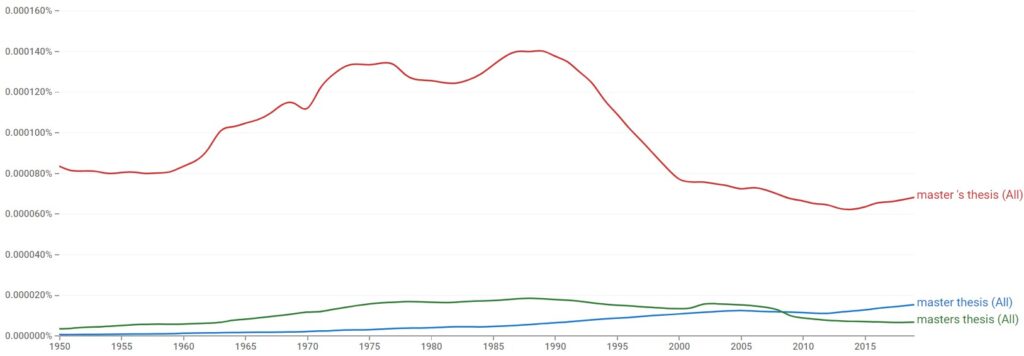
The correct form “Master’s Thesis”, with the appropriate possessive form, is the prevalent phrase, which people use more frequently.
The two incorrect phrases, which are “Master Thesis” and “Masters Thesis” are used much less and seem to be fighting for the lowest position on the graph. As you can see, they are very close together and have already swapped places at the bottom of the graph.
Always avoid using “Master Thesis” and “Masters Thesis”, because they are incorrect, unacceptable forms.
Final Thoughts
“Master’s Thesis” is an expression that means “the thesis of a master”. Because of the strong sense of belonging it presents, it’s important to use it with the correct possessive form, including an apostrophe. “Master’s Thesis” is the correct form. “Master Thesis” is incorrect and should always be avoided.

Martin holds a Master’s degree in Finance and International Business. He has six years of experience in professional communication with clients, executives, and colleagues. Furthermore, he has teaching experience from Aarhus University. Martin has been featured as an expert in communication and teaching on Forbes and Shopify. Read more about Martin here .
- Masters Student or Master’s Student? Here’s The Correct Possessive
- Yours or Your’s or Yours’? (Correct Possessive Explained)
- “From Who” or “From Whom”? Correct Version (With Examples)
- “To Who” or “To Whom”? Correct Version (With Examples)


- Mode Terang
- Gabung Kompas.com+
- Konten yang disimpan
- Konten yang disukai
- Berikan Masukanmu

- Megapolitan
- Surat Pembaca
- Kilas Daerah
- Kilas Korporasi
- Kilas Kementerian
- Sorot Politik
- Kilas Badan Negara
- Kelana Indonesia
- Kalbe Health Corner
- Kilas Parlemen
- Konsultasi Hukum
- Infrastructure
- Apps & OS
- Tech Innovation
- Kilas Internet
- Elektrifikasi
- Timnas Indonesia
- Liga Indonesia
- Liga Italia
- Liga Champions
- Liga Inggris
- Liga Spanyol
- Internasional
- Sadar Stunting
- Spend Smart
- Smartpreneur
- Kilas Badan
- Kilas Transportasi
- Kilas Fintech
- Kilas Perbankan
- Tanya Pajak
- Kilas Investasi
- Sorot Properti
- Tips Kuliner
- Tempat Makan
- Panduan Kuliner Yogyakarta
- Beranda UMKM
- Jagoan Lokal
- Perguruan Tinggi
- Pendidikan Khusus
- Kilas Pendidikan
- Jalan Jalan
- Travel Tips
- Hotel Story
- Travel Update
- Nawa Cahaya
- Ohayo Jepang
- Kehidupan sehat dan sejahtera
- Air bersih dan sanitasi layak
- Pendidikan Berkualitas
- Energi Bersih dan Terjangkau
- Penanganan Perubahan Iklim
- Ekosistem Lautan
- Ekosistem Daratan
- Tanpa Kemiskinan
- Tanpa Kelaparan
- Kesetaraan Gender
- Pekerjaan Layak dan Pertumbuhan ekonomi
- Industri, Inovasi & Infrastruktur
- Berkurangnya Kesenjangan
- Kota & Pemukiman yang Berkelanjutan
- Konsumsi & Produksi yang bertanggungjawab

30 Irregular Plural Nouns beserta Artinya
Kompas.com skola, astrid riyani atmaja,, silmi nurul utami.
Tim Redaksi
Astrid Riyani Atmaja
Penulis silmi nurul utami.

Proper Noun: Pengertian dan Contohnya

Noun Phrase: Frasa Nomina dalam Bahasa Inggris

Collective Noun: Pengertian dan Contohnya

Perbedaan Countable dan Uncountable Noun
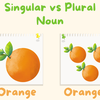
Singular and Plural Noun dalam Bahasa Inggris

TTS Eps 137: Yuk Lebaran

TTS Eps 136: Takjil Khas di Indonesia

TTS Eps 135: Serba Serbi Ramadhan

Games Permainan Kata Bahasa Indonesia

TTS - Serba serbi Demokrasi

TTS Eps 130 - Tebak-tebakan Garing

TTS - Musik Yang Paling Mengguncang

Terkini Lainnya

Contoh Perumpamaan "Kaya Apa" dalam Bahasa Jawa

Ateges Tanpa Basa Jawa

Bahasa Jawa: Wujude Aksara Jawa

Bahasa Jawa: Nulis lan Maca Pawarta

Teori Ordinal dalam Perilaku Konsumen

4 Faktor yang Memengaruhi Laju Reaksi, Apa Saja?

Komunikasi Full Duplex: Pengertian dan Contohnya

5 Perbedaan DNA dan RNA yang Penting untuk Diketahui

Cerita Legendha Basa Jawa

Bahasa Jawa: Ngandharake Crita Legendha

Bahasa Jawa: Ngandharake Surasa lan Nulis Tembang

Ngandharake Pawarta dalam Bahasa Jawa

Perbedaan Each dan Every dalam Bahasa Inggris

Warnanipun Ukara Basa Jawa

Ubah Pernyataan, Ketua KPU Kini Sebut Caleg Terpilih Harus Mundur jika Maju Pilkada
7 manfaat tak terduga dari latihan plank , aditya zoni digugat cerai yasmine ow, purnawirawan tni al ketahuan pakai pelat dinas palsu di bandara soekarno-hatta, kpk ajukan kasasi dalam kasus advokat stefanus roy rening, now trending.

Ketua dan Anggota KPU RI Dijatuhi Sanksi Peringatan oleh DKPP soal Kebocoran Data Pemilih pada 2023

Diam-diam Revisi UU MK, DPR Dianggap "Kucing-kucingan"

Disdik DKI Jakarta Larang Perpisahan dan "Study Tour" ke Luar Kota

Sri Mulyani Sebut Sedang Siapkan Anggaran Pemerintah Prabowo-Gibran

Mungkin Anda melewatkan ini

Simple Past Future Tense: Pengertian, Rumus, Fungsi, dan Contohnya

Jawaban dari Soal "Tina Membeli Pita Merah Sepanjang 7,4 M"

Perbedaan End dan Finish dalam Bahasa Inggris

Jawaban dari Soal "Pak Soleh Memiliki Bambu Sepanjang 8 11/12 M"

Teori Morfologi (Widya Tembung) Bahasa Jawa
- Entertainment
- Pesona Indonesia
- Artikel Terpopuler
- Artikel Terkini
- Topik Pilihan
- Artikel Headline
- Harian KOMPAS
- Kompasiana.com
- Pasangiklan.com
- Gramedia.com
- Gramedia Digital
- Gridoto.com
- Bolasport.com
- Kontan.co.id
- Kabar Palmerah
- Ketentuan Penggunaan
- Kebijakan Data Pribadi
- Pedoman Media Siber
Copyright 2008 - 2023 PT. Kompas Cyber Media (Kompas Gramedia Digital Group). All Rights Reserved.

COMMENTS
Thesis becomes theses in plural form for two reasons: 1) The word thesis has a Greek root, and theses is how it is pluralized in that original language. 2) There are many English words ending with -is that take on -es endings when pluralized: e.g., crisis becomes crises. The pluralization isn't all that unique.
"Theses" is the only way to make the noun "thesis" plural. Confusion arises because some mistakenly believe that all nouns ending in "s" should form a plural that adds "es" to the end of the word. When a noun ends with "is," you need to replace the "is" with an "es" to form the plural. This is because its plural form derives from Greek.
What's the plural of "thesis"? Thesis, (and its plural theses) is an example of one of the many common English words that has roots elsewhere. In this case, thesis is a word that has roots all the way back to Ancient Greek. Like other similarly structured words: diagnosis, synthesis, analysis, oasis, crisis, nemesis and the like, thesis is by no means the only frequently used Greek word ...
By Khamis 23 January 2024. The plural of "thesis" adheres to the Greek-rooted pattern, changing the singular -is to a plural -es. Accurate use of "thesis" and "theses" reflects scholarly precision in both written and oral communication. Awareness of correct pluralization extends to other similar nouns ending in -sis, emphasizing the ...
The plural of thesis is "theses.". In English, most nouns form the plural by adding an "s" at the end. However, "thesis" is one of the few exceptions to this rule. The word "thesis" has a Greek root, and "theses" is how it is pluralized in that original language. Singular.
The meaning of THESIS is a dissertation embodying results of original research and especially substantiating a specific view; especially : one written by a candidate for an academic degree. ... But a thesis may also be an idea; so in the course of the paper the student may put forth several theses (notice the plural form) and attempt to prove ...
THESES definition: 1. plural of thesis 2. plural of thesis . Learn more.
THESES meaning: 1. plural of thesis 2. plural of thesis . Learn more.
Collocations Scientific research Scientific research Theory. formulate/ advance a theory/ hypothesis; build/ construct/ create/ develop a simple/ theoretical/ mathematical model; develop/ establish/ provide/ use a theoretical/ conceptual framework; advance/ argue/ develop the thesis that…; explore an idea/ a concept/ a hypothesis; make a prediction/ an inference
Noun [ edit] thesis (plural theses) ( rhetoric) A proposition or statement supported by arguments. (by extension) A lengthy essay written to establish the validity of a thesis (sense 1.1), especially one submitted in order to complete the requirements for a non- doctoral degree in the US and a doctoral degree in the UK; a dissertation .
thesis in American English. (ˈθisɪs) noun Word forms: plural -ses (-siz) 1. a proposition stated or put forward for consideration, esp. one to be discussed and proved or to be maintained against objections. He vigorously defended his thesis on the causes of war. 2. a subject for a composition or essay. 3.
THESIS meaning: 1. a long piece of writing on a particular subject, especially one that is done for a higher…. Learn more.
The plural form of thesis is theses . Find more words! Many scientists, including people writing doctoral theses, had access to the bones, and they were laboriously studied. They can continue classes or use the research as their master's theses and doctoral dissertations. Today, most universities require their students to submit electronic ...
Noun. ( theses ) A statement supported by arguments. A written essay, especially one submitted for a university degree. * Goldsmith. I told them of the grave, becoming, and sublime deportment they should assume upon this mystical occasion, and read them two homilies and a thesis of my own composing, to prepare them. (logic) An affirmation, or ...
3. As I understand it, you are the bachelor (or at least the bachelor candidate) by virtue of being on the course, and the thesis is yours, so bachelor's thesis is the correct way to go. On the thesis/dissertation thing, a thesis is your argument or proposition, and a dissertation is the discourse you defend it with. Share.
Thesis is singular, theses is plural. Thesis' is singular genitive, theses' is plural genitive. As a general rule for genitives of words ending in s, ... So thesis's is the correct version for the singular form. - Arsen Y.M. Oct 21, 2014 at 22:36. I'm afraid that's not the question, though. - Kris. Dec 2, 2016 at 8:29.
Step 2: Write your initial answer. After some initial research, you can formulate a tentative answer to this question. At this stage it can be simple, and it should guide the research process and writing process. The internet has had more of a positive than a negative effect on education.
Forming the Plurals of Nouns In most cases, a noun will form its plural by adding "s" to the singular form. For example: 1 dog > 2 dogs; 1 house > 2 houses; 1 video > 2 videos; The spelling rules for forming the plurals of nouns (e.g., whether to add "s," "es," or "ies") usually depend on how the noun ends.
Final Thoughts. "Master's Thesis" is an expression that means "the thesis of a master". Because of the strong sense of belonging it presents, it's important to use it with the correct possessive form, including an apostrophe. "Master's Thesis" is the correct form. "Master Thesis" is incorrect and should always be avoided.
Contact tutor. 3 years ago. The plural of thesis is theses. The answer is: 👍. Helpful ( 0) 💡. Interesting ( 0) 😄.
14. I am going to do an oral presentation for my thesis. Normally, when presenting a paper, as the paper is a collaboration work, I always use the pronoun "we". The thesis is written based on the papers. However, when presenting (for example, when talking about the contributions of the thesis), I feel using "we" a bit odd.
Wenn ich noch ma Michael Swan zitieren darf: Singular and Plural: noun modifiers 1. In noun+noun structures, the first noun is normally singular in form even if it has a plural meaning. A shoe shop 2. Some nouns have the plural -s even when modify other nouns.
Kita perlu menghafal setiap kata karena bentuk katanya berbeda dari bentuk tunggalnya. Berikut disajikan 30 contoh irregular plural noun yang sering digunakan dalam kalimat bahasa Inggris beserta artinya. Singular. Plural. Artinya. Alumnus. Alumni. Alumni. Axis.